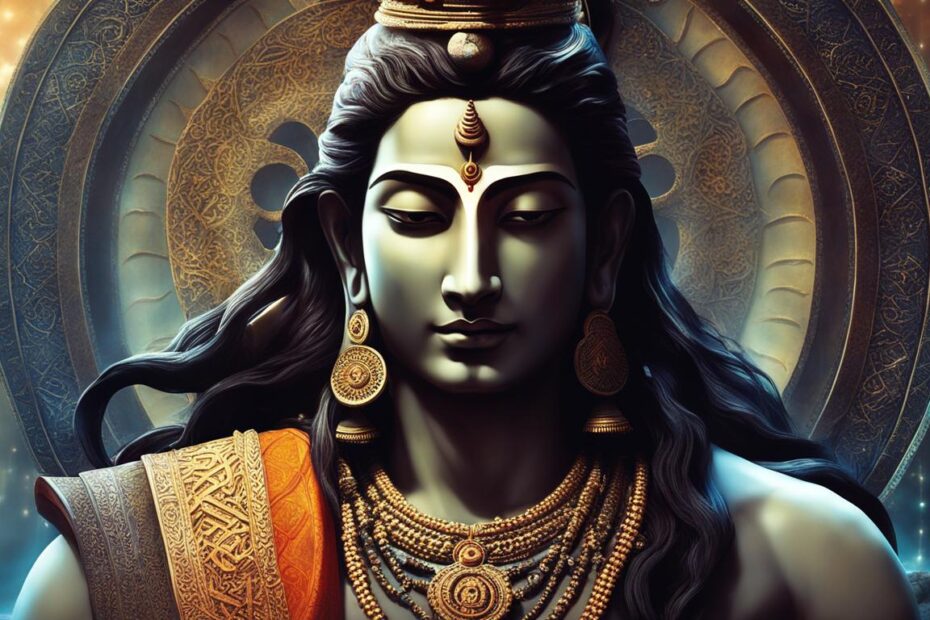Prayer is an integral part of religious beliefs and practices, including Islam and Hinduism. As a Muslim, you may wonder if Lord Shiva, a Hindu deity, will listen to your prayers. This question delves into the complexities of religious beliefs and the concept of interfaith prayer. To gain a deeper understanding of this topic, it is important to explore the significance of prayer in Islam and the worship of Lord Shiva in Hinduism.
Key Takeaways:
- Prayer is a common practice in Islam and Hinduism, connecting individuals to a higher power.
- Muslims perform five daily prayers, known as Salah, to establish a spiritual connection with God and seek guidance.
- Lord Shiva is worshipped in Hinduism, and prayer is a vital part of seeking his blessings and divine intervention.
- Interfaith prayer acknowledges the shared divinity among different faiths and promotes religious tolerance.
- Personal beliefs and the concept of universal spirituality play a role in the question of whether Lord Shiva will listen to the prayers of a Muslim.
The Concept of Prayer in Islam
Prayer holds a significant place in Islam and is considered one of the five pillars of the faith. Muslims are required to perform five daily prayers, known as Salah, which involve specific physical movements and recitation of prayers in Arabic. These prayers serve as a way for Muslims to establish a spiritual connection with God, seek guidance, and express gratitude. Prayer is seen as a form of worship and an opportunity to strengthen one’s faith and seek forgiveness.
In Islam, prayer is not solely viewed as a means of seeking material or worldly desires but rather a means of seeking closeness to God and attaining spiritual purification. It is believed that through prayer, Muslims can establish a direct line of communication with the divine and seek guidance in all aspects of life. The act of prayer involves physical postures such as standing, bowing, and prostrating, which serve to create a sense of humility and submission before God.
Additionally, prayer in Islam is not limited to formal rituals but can also be offered at any time and place. Muslims are encouraged to maintain a constant state of remembrance of God and engage in supplication throughout their day. This allows for a continuous spiritual connection and fosters a sense of mindfulness and gratitude towards God’s blessings.
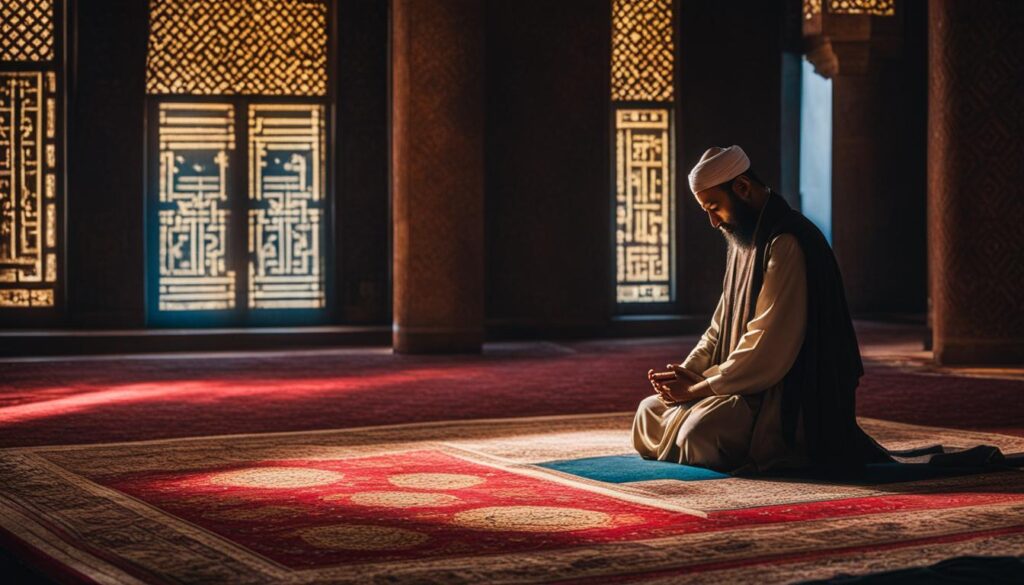
The Spiritual Connection Through Prayer
“Verily, I am Allah. There is no deity except Me, so worship Me and establish prayer for My remembrance.” – The Quran (20:14)
Seeking Guidance and Worship in Islam
Prayer in Islam is not solely an act of seeking guidance and expressing worship, but also a way to seek spiritual tranquility and find solace in times of difficulty. Muslims believe that through prayer, they can find comfort, peace, and solutions to their problems by turning to a higher power.
Worship in Islam is not limited to prayer alone, but also encompasses various acts such as fasting, giving charity, performing pilgrimage, and seeking knowledge. These acts of worship serve to strengthen the bond between the individual and Allah, fostering a deep sense of spirituality and devotion.
Summary
Prayer in Islam is a fundamental aspect of the faith, serving as a means of establishing a spiritual connection with God, seeking guidance, and expressing gratitude. It involves physical movements, recitation of prayers, and a constant remembrance of God throughout the day. Prayer in Islam is not limited to formal rituals but can be offered anytime and anywhere, allowing for a continuous spiritual connection. It is through prayer that Muslims seek spiritual tranquility, find solace, and strengthen their faith.
Lord Shiva in Hinduism
Hinduism is a rich and diverse religious tradition that encompasses a wide range of beliefs and practices. At the center of Hindu worship is Lord Shiva, a deity revered for his role as the destroyer and transformer of the universe. Lord Shiva is considered one of the most important gods in Hinduism, and his worship involves various rituals, prayers, and offerings.
Devotees of Lord Shiva believe that by offering prayers and performing rituals with sincere devotion, they can seek his guidance and blessings. Prayer plays a significant role in the worship of Lord Shiva, with devotees reciting mantras, chanting his names, and expressing their reverence and love.
Lord Shiva is believed to be a compassionate and benevolent deity who listens to the prayers of his devotees and grants their wishes. His devotees turn to him for divine intervention, seeking his support and guidance in various aspects of life, including spiritual growth, healing, and overcoming obstacles.
The worship of Lord Shiva is deeply rooted in spiritual beliefs and traditions, with devotees viewing him as a source of strength, wisdom, and liberation. The prayers offered to Lord Shiva are an expression of devotion and a means to establish a personal connection with the divine.
Divine Intervention and Spiritual Beliefs
In Hinduism, the concept of divine intervention is closely linked to the belief that the gods and goddesses actively participate in the lives of their devotees. Lord Shiva is believed to be present in the lives of his devotees, listening to their prayers and intervening when necessary.
Devotees turn to Lord Shiva for support and guidance during challenging times, seeking his blessings for protection, success, and spiritual fulfillment. The act of prayer is seen as a way to establish a direct line of communication with Lord Shiva and to seek his divine intervention in matters of the heart, mind, and soul.
By offering prayers to Lord Shiva, Hindus believe that they can tap into his divine power and align themselves with his cosmic energy. This connection enables devotees to experience spiritual growth, find inner peace, and navigate the complexities of life with confidence and clarity.
| Key Beliefs | Practices and Rituals |
|---|---|
| Lord Shiva as the destroyer and transformer of the universe | Offering prayers and reciting mantras |
| Seeking guidance and blessings from Lord Shiva | Performing rituals and making offerings |
| Belief in divine intervention and active participation of deities | Expressing devotion and reverence through prayer |
| Establishing a personal connection with the divine | Aligning oneself with Lord Shiva’s cosmic energy |
Interfaith Prayer: Exploring Universal Spirituality and Shared Divinity
Interfaith prayer is a concept that embraces the idea of universal spirituality and the recognition of shared divinity among different faiths. While it may not be a common practice in traditional Islamic or Hindu rituals, interfaith prayer highlights the importance of religious tolerance and respect for diverse beliefs. It serves as a reminder that at the core of all religions is a shared pursuit of spiritual enlightenment and a belief in a higher power.
In interfaith prayer, individuals from different religious backgrounds come together to pray, acknowledging their common humanity and the interconnectedness of all faiths. It is an opportunity to transcend religious boundaries and unite in a collective pursuit of peace, love, and understanding. Interfaith prayer allows people to find common ground and shared values, fostering a sense of harmony and respect among diverse religious communities.
“Interfaith prayer allows people to find common ground and shared values, fostering a sense of harmony and respect among diverse religious communities.”
The Power of Interfaith Prayer
Interfaith prayer has the potential to promote empathy, compassion, and religious harmony. It encourages individuals to move beyond their own religious traditions and engage with different spiritual practices, broadening their understanding of the world and deepening their own faith. By participating in interfaith prayer, people can gain a greater appreciation for the diversity of religious beliefs and develop a sense of unity amidst the differences.
Furthermore, interfaith prayer can inspire social action and collective efforts towards addressing global issues. In a world that is increasingly interconnected, interfaith prayer offers a platform for dialogue and cooperation, facilitating the collaboration of individuals from various religious backgrounds to work towards common goals such as peacebuilding, social justice, and environmental sustainability.
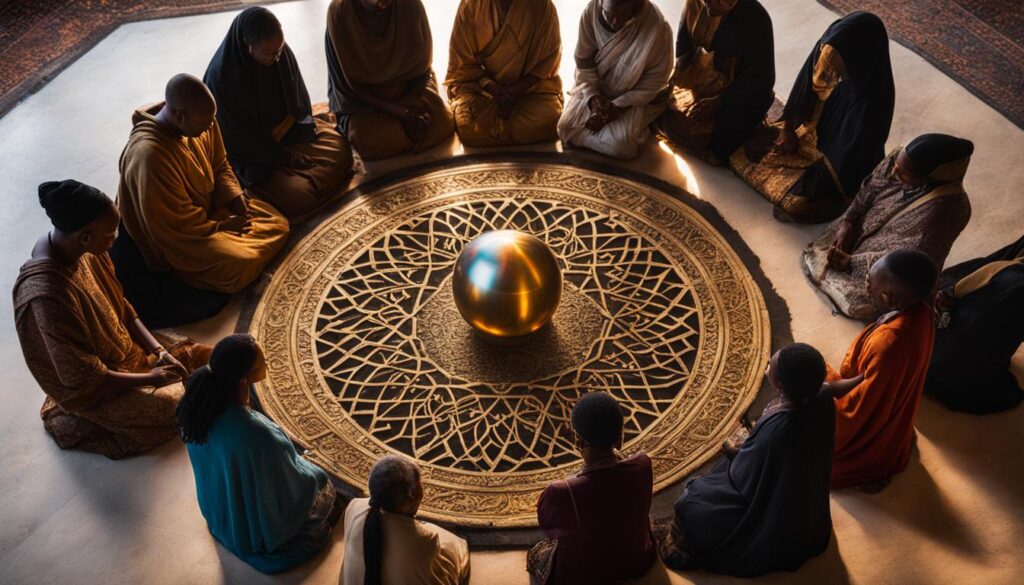
The Importance of Religious Tolerance
Engaging in interfaith prayer requires a mindset of religious tolerance, which involves respecting and accepting the beliefs and practices of others. Tolerance does not mean compromising one’s own faith, but rather embracing the idea that different paths can lead to the same ultimate truth. It is through tolerance that individuals can build bridges of understanding and promote peaceful coexistence in our diverse society.
By participating in interfaith prayer, individuals have the opportunity to challenge stereotypes and prejudices and create meaningful connections with people of different faiths. It encourages dialogue, empathy, and a commitment to building a more inclusive and harmonious world that honors the sacredness of all religious traditions.
| Benefits of Interfaith Prayer | Meaningful Connections | Religious Tolerance |
|---|---|---|
| Enhanced understanding of different faiths | Fosters empathy and compassion | Challenges stereotypes and prejudices |
| Promotes unity amidst diversity | Inspires social action and collaboration | Creates a more inclusive society |
| Deepens personal faith | Encourages dialogue and mutual respect | Builds bridges of understanding |
Personal Perspective and Beliefs
Each individual’s beliefs and personal spiritual journey are unique. While some Muslims may feel a deep connection to Islam and find solace in the teachings of the Quran, others may question and explore their faith in a broader sense. It is important to recognize and respect the diversity of beliefs within the Muslim community. Some Muslims may feel a personal connection to Lord Shiva or other Hindu deities and may choose to integrate aspects of Hinduism into their prayers. Ultimately, the question of whether Lord Shiva will listen to the prayers of a Muslim is a personal and subjective one.
Seeking answers and finding meaning in one’s spiritual journey is a fundamental aspect of faith in Islam. Muslims are encouraged to contemplate and explore their beliefs, seeking knowledge and understanding in their quest for spiritual enlightenment. This exploration may lead individuals to question the boundaries and intersections of different religious traditions, including Islam and Hinduism. While there may not be a definitive answer to whether Lord Shiva will listen to the prayers of a Muslim, it is crucial to approach this question with an open mind and a sincere desire to deepen one’s connection with a higher power.
In Islam, personal beliefs play a significant role in shaping an individual’s spiritual journey. Muslims are encouraged to seek knowledge, engage in self-reflection, and constantly strive for a deeper understanding of their faith. Through this process of self-discovery, Muslims may find that their personal beliefs are influenced by a wide range of factors, including cultural background, personal experiences, and interactions with different religious traditions. It is within this context that some Muslims may feel a personal connection to Lord Shiva or other deities, integrating elements of Hinduism into their prayers as they navigate their own spiritual path.
As Muslims seek answers to their spiritual questions and explore the boundaries of their faith, it is important to approach these inquiries with humility and respect for diverse beliefs. Engaging in meaningful dialogue with religious scholars, seeking guidance from trusted mentors, and studying the teachings of Islam can provide valuable insights and guidance. Ultimately, the personal perspective and beliefs of each Muslim play a vital role in shaping their spiritual journey and the way they approach prayer and worship.
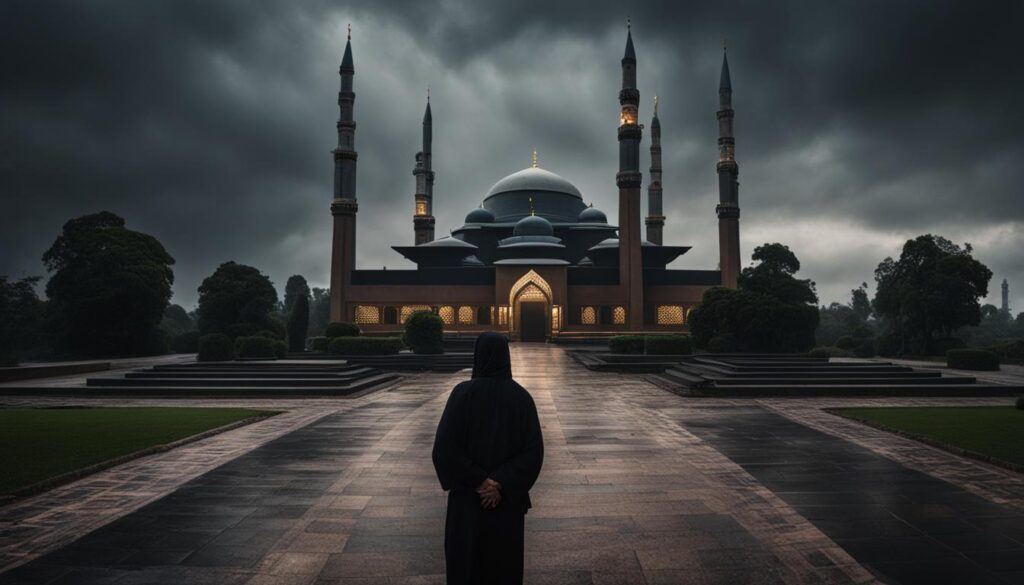
Table: Comparing Personal Beliefs in Islam and Hinduism
| Islam | Hinduism | |
|---|---|---|
| Belief in One God | Central tenet of Islam – belief in the oneness of Allah | Polytheistic belief in many gods and goddesses |
| Practices and Rituals | Five daily prayers, Ramadan fasting, pilgrimage to Mecca | Worship through prayers, rituals, and offerings to deities |
| Scripture | Quran as the holy book of Islam | Vedas, Upanishads, and other scriptures |
| Concept of Afterlife | Belief in a Day of Judgment and reward or punishment in the afterlife | Belief in reincarnation and the cycle of birth, death, and rebirth |
| Concept of Ultimate Truth | Belief in the ultimate truth revealed in the Quran | Seeking ultimate truth through personal experience and spiritual practices |
Understanding Universal Spirituality
Universal spirituality encompasses the belief in a higher power or divine presence that transcends individual religious traditions. It is a concept that emphasizes the interconnectedness of different religions and the shared pursuit of spiritual enlightenment. Muslims who contemplate the question of whether Lord Shiva will listen to their prayers may find solace in the idea of universal spirituality, as it suggests that their prayers are heard by a higher power, regardless of the specific deity they address.
This belief in universal spirituality recognizes that faith in a higher power is a fundamental aspect of human existence, and that different religious traditions offer unique paths to connect with that power. It encourages individuals to see beyond the limitations of religious boundaries and to seek common ground with people of different faiths. By embracing the concept of universal spirituality, Muslims can foster a greater sense of unity and understanding with others, as they recognize the shared goal of seeking a higher truth.
“Universal spirituality suggests that prayer is a universal language that speaks to the depths of the human soul, regardless of the specific deity being addressed.”
This interconnectedness of religions highlights the importance of respecting and appreciating the diversity of beliefs and practices in the world. It encourages individuals to explore different perspectives and to find wisdom and inspiration in various religious traditions. Universal spirituality invites Muslims to engage in meaningful dialogue with people of different faiths, to learn from one another, and to cultivate a deeper understanding of their own spiritual journey.

As Muslims navigate their own personal exploration of faith, the concept of universal spirituality offers a framework that supports the interconnectedness of religions and the belief in a higher power. It encourages individuals to seek the common threads that run through different spiritual traditions and to find beauty and truth in diverse expressions of faith. By embracing universal spirituality, Muslims can deepen their connection to their own religious beliefs while also fostering a sense of unity, respect, and interconnectedness with the broader world of spirituality.
The Power of Faith and Intentions
The power of faith and intentions in prayer is a fundamental aspect of both Islam and Hinduism. In Islam, the sincerity and purity of one’s heart and intentions are considered vital in establishing a meaningful connection with God. This belief emphasizes the importance of having unwavering faith and genuine intentions when engaging in acts of worship, including prayer. Similarly, Hindu customs also emphasize the significance of devotion and faith in the effectiveness of prayers.
When a Muslim prays to Lord Shiva or any other deity with the intention of seeking guidance and spiritual connection, they may believe that their prayers will be heard. This belief stems from the understanding that the sincerity of one’s intentions and the conviction placed in their faith can transcend religious boundaries and reach a higher power. It is the power of faith that enables individuals to connect with a divine presence and seek solace, guidance, and blessings.
“True sincerity in worship allows us to establish a direct line of communication with God. It is not the specific deity we address in our prayers that matters, but rather the sincerity and purity of our intentions.”
By focusing on the power of faith and intentions, Muslims can find solace in their prayers, regardless of the specific deity they address. This understanding fosters a sense of unity and respect for diverse beliefs, promoting an atmosphere of religious tolerance and acceptance. It allows individuals to explore their faith and connect with a higher power while embracing the values of love, compassion, and service that are fundamental to Islam, Hinduism, and many other religions.
The Power of Faith and Intentions in Prayer
The power of faith and intentions in prayer is emphasized in both Islam and Hinduism. Muslims believe that the sincerity and purity of one’s heart and intentions are crucial in establishing a meaningful connection with God. Similarly, Hindu customs emphasize the importance of devotion and faith in the effectiveness of prayers. Muslims who sincerely and wholeheartedly pray to Lord Shiva or any other deity with the intention of seeking guidance and spiritual connection may believe that their prayers will be heard, regardless of the specific deity they address.
Embracing the Journey of Faith
The question of whether Lord Shiva will listen to the prayers of a Muslim invites individuals to reflect on their own personal journey of faith and exploration. It is an opportunity for Muslims to deepen their understanding of their own religious beliefs and practices while also exploring the spiritual teachings of other traditions. Embracing the journey of faith involves seeking knowledge, engaging in meaningful dialogue, and fostering a sense of self-discovery. Ultimately, the answers to such questions may be found through personal reflection, guidance from religious scholars, and a sincere desire to connect with a higher power.
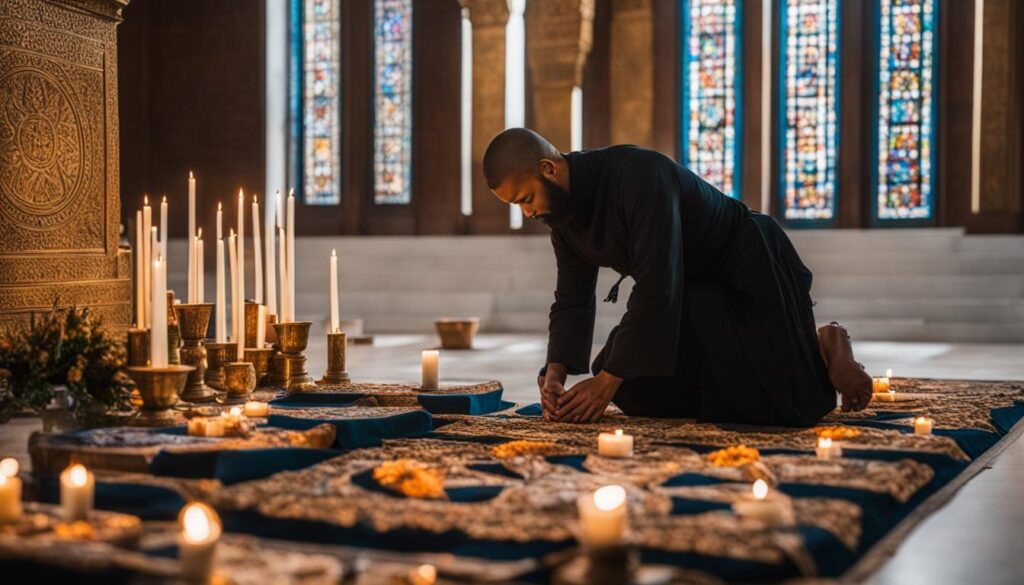
Table: Comparison of the Power of Faith and Intentions in Islam and Hinduism
Aspect Islam Hinduism Importance of Faith Emphasized as a cornerstone of worship Seen as crucial for the effectiveness of prayers Role of Intentions Sincerity and purity of intentions are essential Devotion and faith enhance the power of prayers Transcending Religious Boundaries Belief in the power of faith to connect with God Recognition of shared divinity and universal spirituality Prayer as a Means of Connection Establishing a direct line of communication with God Seeking blessings and divine interventionFinding Common Ground in Religious Beliefs
When it comes to matters of faith, finding common ground and fostering respect for diverse beliefs are essential for building a harmonious society. While there may be differences in religious practices and traditions, there are shared values that can unite people from different faiths. By recognizing and embracing these shared values, individuals can promote understanding and tolerance among different religious communities.
The Importance of Shared Values
Shared values form the foundation of a cohesive society. Despite the differences in religious rituals and practices, many religions emphasize fundamental principles such as love, compassion, and service to others. These values provide a common thread that connects people from different faiths and allows them to work together for the betterment of society.
In a world that is becoming increasingly interconnected, it is vital to recognize the importance of finding common ground in religious beliefs. By focusing on shared values, individuals can engage in meaningful dialogue and build bridges of understanding and respect. This can help overcome stereotypes and prejudices, fostering a sense of unity and collaboration among diverse religious communities.
“In diversity, there is beauty and there is strength.” – Maya Angelou
Promoting Religious Tolerance
Respecting diverse beliefs and promoting religious tolerance are crucial for maintaining social cohesion and harmony. By acknowledging the validity of different religious perspectives, individuals can create an environment where everyone feels valued and accepted. This includes recognizing and supporting individuals’ rights to practice their faith and express their beliefs freely.
| Shared Values | Religious Practices |
|---|---|
| Love and compassion | Acts of kindness and charity |
| Respect for others | Interfaith dialogue and cooperation |
| Forgiveness | Seeking reconciliation and peace |
| Justice and fairness | Promoting equality and social justice |
By understanding and respecting the shared values across different religious traditions, individuals can find common ground that transcends religious boundaries. This lays the foundation for a more inclusive and tolerant society, where people of all faiths can coexist peacefully and work towards a brighter future.
Embracing the Journey of Faith
The question of whether Lord Shiva will listen to the prayers of a Muslim invites individuals to embark on a personal exploration and experience spiritual growth. The journey of faith is a deeply personal one, filled with introspection, self-discovery, and a quest for meaning. It is an opportunity for Muslims to delve into their own religious beliefs and practices, while also seeking wisdom and guidance from the teachings of other traditions.
During this journey, individuals may find themselves questioning and exploring their faith, seeking answers to important spiritual questions and seeking a deeper connection with a higher power. It is a time of self-reflection, learning, and growth. Through personal exploration, Muslims can gain a broader understanding of their own beliefs and develop a more nuanced perspective on their relationship with God.
“The journey of faith is not always easy, but it is a path of profound transformation and enlightenment.” – Anonymous
As individuals embrace the journey of faith, they open themselves up to new perspectives and insights. They may discover commonalities between different religious traditions, recognizing shared values such as love, compassion, and respect for diverse beliefs. This broader understanding can foster unity and respect among different faiths, allowing Muslims to approach their prayers with a sense of reverence and a recognition of the interconnectedness of all spiritual paths.
| Journey of Faith | Benefits |
|---|---|
| Personal Exploration | Growth, self-discovery, and a deeper understanding of one’s beliefs. |
| Spiritual Growth | A sense of connectedness, unity, and respect for diverse beliefs. |
| Seeking Answers | Finding meaning, wisdom, and guidance from diverse religious teachings. |
As Muslims embrace the journey of faith, they embark on a transformative process that allows for personal growth, a deeper connection with a higher power, and an appreciation for the diverse spiritual paths that exist. Through personal exploration, seeking answers, and appreciating the interconnectedness of all faiths, Muslims can navigate complex questions and find solace in their prayers, regardless of the specific deity they address.
Conclusion
In conclusion, the question of whether Lord Shiva will listen to the prayers of a Muslim is a complex and personal one. Prayer holds a significant place in Islam and Hinduism, with each tradition offering its own unique practices and beliefs. However, the concept of universal spirituality and the recognition of shared divinity among different faiths provide a broader perspective.
Ultimately, the power of faith, sincerity in prayer, and personal beliefs play a crucial role in establishing a spiritual connection with a higher power, regardless of the specific deity one addresses. Embracing the journey of faith and seeking knowledge can help individuals navigate these complex questions and deepen their understanding of their own religious beliefs.
By recognizing the importance of prayer as a universal spiritual practice and finding common ground in shared values, Muslims can approach their prayers to Lord Shiva or any other deity with a sense of unity and respect for diverse beliefs. The journey of faith involves personal exploration, spiritual growth, and a sincere desire to connect with a higher power. Through reflection and guidance, individuals can find their own answers and strengthen their relationship with the divine.
FAQ
Is prayer an important practice in Islam?
Yes, prayer is considered one of the five pillars of Islam and holds a significant place in the faith.
How many times a day do Muslims pray?
Muslims are required to perform five daily prayers, known as Salah.
What is the purpose of prayer in Islam?
Prayer serves as a way for Muslims to establish a spiritual connection with God, seek guidance, and express gratitude.
Who is Lord Shiva in Hinduism?
Lord Shiva is one of the most important deities in Hinduism, often regarded as the destroyer and transformer of the universe.
How do Hindus worship Lord Shiva?
Hindus worship Lord Shiva by offering prayers, performing rituals, and reciting mantras to seek his guidance and blessings.
Do Muslims engage in interfaith prayer with Hindu deities?
While interfaith prayer is not common in traditional Islamic practices, the concept highlights the importance of religious tolerance and respect for different belief systems.
Can a Muslim pray to Lord Shiva?
The question of whether Lord Shiva will listen to the prayers of a Muslim is a personal and subjective one.
What is universal spirituality?
Universal spirituality refers to the belief in a higher power or divine presence that transcends individual religious traditions.
How important is faith in prayer?
Both Islam and Hinduism emphasize the power of faith and sincerity in establishing a meaningful connection with a higher power.
Is there common ground between Islam and Hinduism?
Finding common ground and shared values can foster understanding and mutual respect among different faiths, including Islam and Hinduism.
How can individuals navigate questions of faith and prayer?
Embracing the journey of faith involves seeking knowledge, engaging in meaningful dialogue, and fostering a sense of self-discovery.


